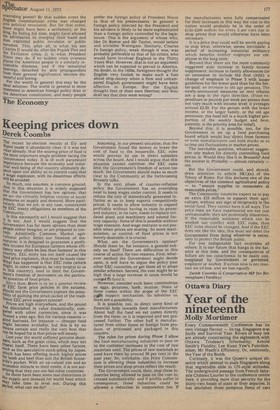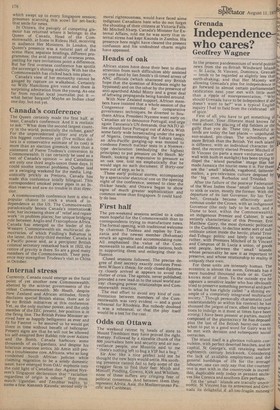Ottawa Diary
Year of the nineteenth
Molly Mortimer
Every Commonwealth Conference has its own vintage flavour — its tag. Singapore was Strife and Survival Year. Rivers of busy ink are already constrasting the eighteenth with Ottawa: Trudeau's Informality; Arnold Smith's Fluidity; Lee Kuan Yew's Functionalism; Mr Heath's Efficiency. Or, ominously, the Year of the Bomb.
Curiously, it was the Queen's unique absence which seemed to push Singapore along that regrettable slide to UN-style attitudes. The underground passage from French fairytale Chateau Laurier to the conference centre here, it providing more than security for the thirty-two heads of state or their deputies. It has abolished those pompous fleets of cars
which swept up to every Singapore session; pressmen scanning this scowl for set-back; that smile for news.
In Ottawa, the panoply of competing glamour has returned where it belongs: to the Queen of Canada, Head of the Commonwealth, at home in Rideau Hall, receiving in audience Her Ministers. In London, the Queen's presence was a natural part of the scene. Here, separate briefings, different programmes; the avid interest of overseas press, jostling for rare invitations point a difference. But her first overseas conference has spotlit the sovereign's shining stability. With her the Commonwealth has clicked back into place. Canada's view of her monarchy cannot be gauged by rapture on walkabout. Certainly no Willy Hamiltons give voice and there is surprising admiration from the young. As one far from royalist local journalist put it — what better bargain? Maybe an Indian chief one day, but not yet.
Canada's conference
The Queen certainly made the first half, at least, Canada's conference. And it is realistic to ask: What does the second largest country in the world, potentially the richest, gain? For the unprecedented glitter and style of this biggest conference yet (five million dollars is a conservative estimate of its cost) is more than an election gimmick; more than a statement of Pierre Trudeau's conversion to Commonwealth. It can certainly be used as a test of Canada's opinion — and Canadians are only one third anglo-saxon these days. It could soothe internal problems. Quebec laid on a swinging weekend for the media. Linguistically prickly as Pretoria, Canada has made this conference totally bilingual. This correspondent smoked peace pipes in an Indian reserve and saw no trouble in that direction.
A commonwealth conference here is also a popular chance to cock a snook of independence at the US. The Commonwealth paradoxically boosts Canada's international role; her increasing share of' relief and repair work ' in problem places; her unique bridging role between Anglo-and Francophone Africa. Canada has emerged as the leader of the Western Commonwealth-six multiracial democracies, of which Pindling's Bahamas is the latest, the thirty-third member. Canada is a Pacific power and, as a percipient British colonial secretary remarked back in 1922, the centre of gravity is there. So are a good many members of the Commonwealth. Their presence may strengthen Trudeau's visit to China in October.
Internal stress
Currently, Canada could emerge as the focal point of yet another new Commonwealth, abetted by the activist governments of the oldest Commonwealth. Mr Heath, despite New Zealand and African attitudes, firmly disclaims special British status; there are to be no British initiatives at this conference. Yet, as the only nuclear power, and the only member of the EEC present, her position is in the firing line. The British Prime Minister arrived here as happily belligerent as ever and fit for Fastnet — he assured us he would get there in time without benefit of helicopter. Present signs are that he will not be allowed his self-assigned Brer Rabbit role over Asians and the Bomb. Canada harbours some thousands of ex-Ugandans, and despite his hilarious ansentee antics, Idi Amin still proves a troublesome core. Africans, who so long condemed South African policies while claiming migration to be a solely domestic issue, have emerged from OAU euphoria into the cold light of Canadian day. Against Nyerere's Singapore declaration that "racialism regardless of origin is odious" they must match Ugandan, and Zanzibar reality, to name a few. Kenneth Kaunda, second only in moral righteousness, would have faced some indignant Canadians here who do not forget the shooting of their citizens at Victoria Falls. Mr Mitchell Sharp, Canada's Minister for External Affairs, told me he was sorry that internal stress had kept Kaunda in Zambia. His presence here might have cleared the present confusion and his undoubted charm might have appeased.
Heads of oak
African states have done their best to divert attention from such difficulties ably assisted on one hand by Ian Smith's ill-timed arrest of ANC officials (which shattered any British hope that the question of Rhodesia might be bypassed) and on the other by the presence of anti-apartheid Abdul Minty and a great deal of leftwing propaganda being handed around. With New Zealand support, African members have insisted that a whole session of the Congerence intended for comparative government techniques, be diverted to Southern Africa. President Nyerere went early on Canadian air to denounce Portugal, and urge again Tanzania's UN demands, that NATO allies should force Portugal out of Africa. With some fairly wide horsetrading under the aegis of Nigeria, (remembering the Sahara tests), an Afro-Pacific ganging-up was mooted to condemn French nuclear tests in a Nyerere-. type declaration (embodying the highest principles) to put pressure on Mr Heath. Mr Heath, looking as responsive to pressure as an oak tree, told me emphatically that he would sign no such document. If thirty-one' were out of step, so be it. These early political storms, accompanied by a spectacular electrical one on the opening night of the conference, seemed to clear the thicker heads. and Ottawa began to show signs of much greater sophistication and common sense than Singapore. It could hardly do less.
First half
The pre-weekend sessions settled to a calm more hopeful for the Commonwealth than to correspondents trying to manufacture news. The formal opening, with traditional welcome by chairman Trudeau and replies by Tanzania and the newest member (Bahamas) struck an agreable and accommodating note. All emphasised the value of the Commonwealth to small and middle nations, both in supporting them and enlarging their influence.
Closed sessions followed. The precise degree of their secrecy exactly confutes President Wilson's thesis; for only closed diplomacy closely arrived at appears to avoid the clutter of crisis. The agenda, never published, provided a new lead-in to the usual world survey: changing power relationships and Commonwealth reaction.
The real effort to avoid any kind of confrontation between members of the Commonwealth was very evident — and a good rehearsal for Rhodesia. But nobody doubted it was a rehearsal, or that the play itself would be a test for the cast.
Odds on Ottawa
The weekend retreat by heads of state to Mount Tremblant may have proved the right therapy. Followed by a sizeable chunk of the 800 journalists here and security and air surveillance people, one Mountie said to me " there's nothing left to bug a VIP but a bug." Sir Alec like a nice prefect told me he thought the new boys would settle. His soothing presence cannot fail to help some of the craggier faces to find their feet: Mujib and Mintoff; Pindling, Gowon, Kirk and Whitlam; none of these suffers any cringing fear of political consensus. And between them they represent Africa, Asia, the Mediterranean Pacific and Caribbean.



































 Previous page
Previous page